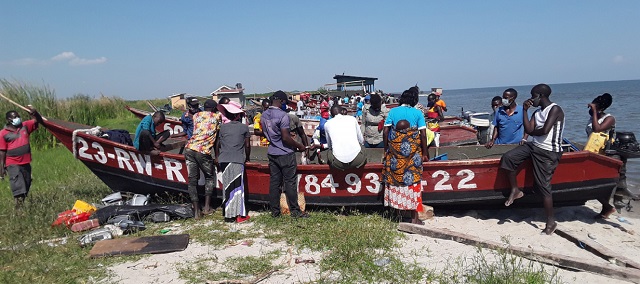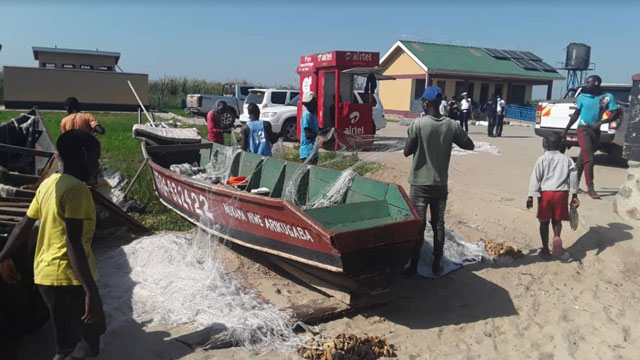
Increasing catches on Lake Edward show fruits of co-operation
For almost half a century, fishing on Lake Edward in southwestern Uganda has been dangerous for Ugandan fishermen because of its proximity to the insecure eastern Democratic Republic of Congo. About 70% of Lake Edward’s 2,325 sq km surface area is inside Congolese territory; so the lake is a shared fisheries resource. That has meant that confrontation between Ugandan and Congolese fishermen on the lake is quite common and makes fishing a perilous job, especially for Ugandans. However, a recent cross-border project, under the auspices of the Nile Equatorial Lakes Subsidiary Action Programme-Coordination Unit (NELSAP-CU) appears to be restoring hope for fishing communities on either side of the lake’s shores as The Independent’s Ronald Musoke found out on a recent visit to Rwenshama fish landing site in the southwestern district of Rukungiri.
At about 11am, with the sun already blazing, hundreds of young men and a few women were hunched around dozens of canoes painted in bright colours. They were busy untangling hundreds of knotty fishing nets to help fishermen prepare for their expeditions when the sun sets.
Many of these boats, about 60 of them now docked on the lakeshores at this small but lively landing site landed with hundreds of tonnes of fish earlier in the morning and trading was still going on.
It is a beehive of activity when boats laden with fish dock here—usually between 7am—10am. The melee of hundreds of fishermen, brokers, fishmongers, cart pushers, bodaboda cyclists and even small trucks is a sight to behold. As soon as a boat lands, the pushing and shoving begins as men and women surround the boats and immediately start haggling with the fishermen over prices.
The fish sold here is mainly Nile tilapia, African Cat fish (Clarias gariepinus), Semutundu (Bagrus docmak) and Marbled Lung fish (Protopterus aethiopicus).
Once an agreement is struck, the fishermen saunter into nearby shacks in the trading centre to rest or drink. The brokers pick the fish and take it to washing bays for cleaning before they sell it to waiting fishmongers who will in turn whisk away the fish and sell it in markets as far as Kampala and Mpondwe on the Uganda-DR Congo border.
“Brokers buy fish from the fishermen on the boats while the fishmongers will wait with their money on the side. That is their arrangement,” Ananias Mutabazi, the Fisheries Officer in charge of Rwenshama landing site told The Independent.
“There are about 2,000 people at this landing site meaning that the people living here are more than the number of boats allowed on this side of the lake,” he said, “Those who don’t have a lot of capital to buy fish and sell it in the market do the middleman’s work.”
Everything seems orderly.
Rwenshama fish landing site is a recently upgraded fish handling facility under the second phase of the multinational Lakes Edward and Albert Integrated Fisheries and Water Resources Management (LEAF II).

The fish handling facility has clean running water pumped from a nearby underground tank. There is also an office for the Fisheries Protection Unit under supervision of the national army—the UPDF. The unit also has two speed patrol boats on the ready. The landing site also has sanitation facilities and it has been fenced to keep the dangerous wild animals away since this landing site is on the edge of the Queen Elizabeth National Park.
Mutabazi, the fisheries officer, says before the upgrade, “It was chaotic.”
“Before the project, this was a stretch of sandy beach. There was a makeshift timber structure but it was not as clean as you see now. Fishing was unregulated and there were hundreds of boats on the lake. The fishermen deployed all sorts of fishing gear to catch as much fish as possible,” he says.
It did not help that on the other side of the lake, in DR Congo, worse was happening, thanks to the eternal militia activity in North Kivu province under which this lake falls. As a result, the conflict between DR Congo and Uganda fishers grew as demand for the dwindling stocks of fish increased.
“When the fishermen brought the fish ashore, the haggling over prices happened on the sandy stretch of beach. The fish would also be sold without being cleaned.”
“For years the landing site did not have sanitation facilities like these washing bays. These days, when we take our clean fish to the market, it commands a good price,” Henry Kyansi, the chairman of the landing site told The Independent in June, this year.
Olive Nakilanda, a fish monger who has worked at this landing site for 15 years told The Independent that before improvements were made at Rwenshama, a big Cat fish, probably weighing 10kg, would have gone for Shs 25,000. She lifts the huge slippery fish out of the bucket. She says, today, she will sell it at around Shs 35,000.
In addition to improvement in cleaning facilities, Nakilanda attributes the marked increase in prices to the size of the fish being captured. Bigger and mature fish is now captured because the fishermen have been ordered to use a certain gauge of fishing nets in Lake Edward.
We meet Apollo Akiiki, 23; a second year student of Social Work and Social Administration at Great Lakes University in Kanungu District in southwestern Uganda. He is one of the 60 boat owners at this landing site. He says his community has benefitted from the project.
“At first, we could pick the fish from the lake and take it straight to the market with sand all over it. The landing site was full of sand.”
“We also used to fetch water straight from the lake but the landing site now uses cleaner water pumped from underground. They have also constructed fish kilns for us.”
“Before this project came around, fishermen would take home about Shs 60,000 but today the least one gets is about Shs 100,000. This is because the fish is clean when you sell it to the fishmonger, the fish looks clean, and it is big and really looks nice.”
“The dangerous animals, especially elephants and hippos were also a problem. They would come and disturb the people but with the perimeter fence now erected, the face-off with the animals is now rare,” Akiiki told The Independent.
 The Independent Uganda: You get the Truth we Pay the Price
The Independent Uganda: You get the Truth we Pay the Price



